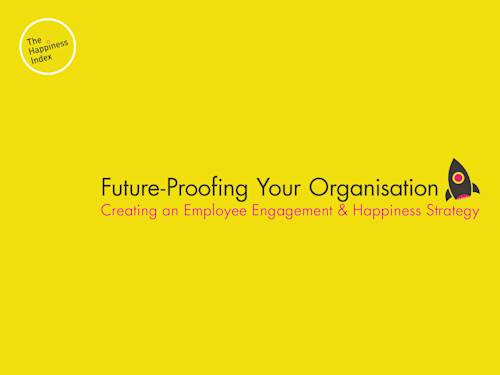
Creating an Employee Engagement AND Happiness Strategy
We live in a world where feedback is king (think about Tripadvisor, Glassdoor and Google reviews). Feedback can be incredibly beneficial or incredibly harmful to your business. This is entirely dependent on your management process. When feedback isn't handled correctly it creates irreparable damage to your employer branding and reputation... especially if it becomes public! Read our useful tips on how to handle feedback effectively.
Businesses can struggle with controlling consumer feedback it's often sporadic and they will have to create actions and be reactive if it's negative. Of course, you can put processes in place to request and manage feedback, but clients don't have to adhere... However, employee feedback is within your control and needs to be managed effectively to ensure happy workers, high retention rates and a strong company culture. Not to mention that if staff feedback is ignored then the issue may escalate which could lead to things getting public, embarrassing and often messy!
I'm seeing more and more companies publicly outed for poor working practices. There have been some very memorable examples recently that could have been prevented if the companies had an effective feedback programme in place and dealt with their problems internally before they escalate. The recent case with Nike is a key example of this:
Two former employees filed a lawsuit against alleging sexual discrimination claiming Nike pays women less than their male counterparts and offers smaller bonuses and annual salary increases for women.
Nike released this as their response; Nike opposes discrimination of any type and has a long-standing commitment to diversity and inclusion. We are committed to competitive pay and benefits for our employees. The vast majority of Nike employees live by our values of dignity and respect for others. This statement is very scathing and appears to attack the people speaking out against their business. This only serves to fuel the fire in my opinion. It's cold, inhuman and provides no evidence to support its view. It's a stock answer and the employees didn't feel the company was really listening or taking them seriously.
These public outings have increased exponentially since Employment Tribunal fees were abolished in December 2017. This is evidenced by The Ministry of Justice who state there was 7,042 single claims received in July to September 2017, compared to 4,241 in the period April to June 2017. This represents a 66% increase since Employment Tribunal fees were abolished. It's clear that employees, like customers, are no longer willing to let their views remain unheard. If the company they work for isn't listening then they will likely escalate the issue to a more public and problematic forum, like a tribunal.
There are more and more stories where employees report problems to HR only to have them dismissed or ignored! What is causing these HR teams to dismiss potentially serious allegations!?
I was reading about a recent case involving Uber, which let's face it isn't that rare these days. They have had their dirty laundry aired so much, that they are almost synonymous with their terrible PR! Anyway, this recent story is a prime example of a business tackling an issue in a manner which promotes the business negatively and intensifies the problem. It involves their Head of HR resigning following an investigation into how she failed to correctly handle allegations of racial discrimination. She was accused by anonymous whistle-blowers of systematically dismissing complaints of racial discrimination. The exit came after one whistle-blower threatened to go public with grievances if the company didn't act immediately.
I've also read multiple stories about United Airlines recently. Their story is a prime example of not dealing with feedback in a positive way: A captain allegedly posted sexually explicit images of a flight attendant to various websites on a frequent basis. Alarmingly, despite constant complaints from staff, United failed to correct the pilot's behaviour.
For both issues, the problem intensified as the businesses didn't react to the feedback and instead chose to adopt the 'Ostrich approach' whereby you bury your head in the sand and hope everything will pass you by. This is not advised. Ignoring the issue leads to the problem intensifying and the individual taking their grievances and airing them externally where people will take notice. Once it's out, it's out and the public scrutiny will be detrimental for your reputation and in many cases your profits! Whether the allegations are true or not your reputation is likely to suffer.
The spotlight shines brightly on HR and the role they must play to prevent these cases. The most effective HR departments will create an environment where these issues rarely arise and on the rare occasions they do, there will be systems in place to tackle the issue before word spreads or there is any need for employees to escalate.
Training managers and staff on how to handle negative feedback is key otherwise the whole programme unravels. Think about preparing managers for the negative feedback they may read, teach them how not to take it personally and explain how important anonymity and confidentiality is. Otherwise things will only get worse!
Ensure all staff (specifically managers) understand the right reasons for feedback: Before any feedback programme is launched it's important to communicate what the company wants to achieve and how everyone has a part to play by offering clear and honest feedback.
Create a clear plan around responding to feedback: Ensure there is a clear process on how managers respond to feedback. It is imperative that the whole management team are aware of the plan and can answer questions on it.
Appropriate tone and language.
Response times for replying to feedback.
Taking emotion out of responses and staying on topic.
Demonstrating you have understood their sentiment.
Expectation management.
Offer clear and specific next actions.
Respond when possible, to demonstrate you care: The effort will be hugely appreciated and in some amazing cases it could end up going public but this time for the right reasons!
Read this letter below that is from Barnsley FC's CEO. He sent it to a fan after reading worrying social media posts. He understands the power of listening to people and demonstrating that you value them, so sent a reply that highlights that he cares and provides action plans:

A wonderful example of feedback done well! You can see by the number of retweets that positive news is just as viral and compelling to read as controversy:
Formalise the process so employees get a consistent experience post-feedback: Will your managers know who gave feedback? Will they sit down with everyone? Will the analysts group the key themes and create generalised action plans or consider every point? How quickly must feedback be responded to? Do you managers have time to handle it properly? When will you communicate action plans?
Get to know your people: Do you know which staff can and can't handle personal or negative feedback? Plan comprehensive training on how to handle feedback to help make the process more seamless.
Consider everyone's emotional intelligence (EQ): Respond to feedback in a manner that compliments their EQ, so it has the desired effect and isn't misconstrued. When delivering negative feedback try to frame it positively and focus on the good points as well as the bad.
Provide training on managing grievances: Ensure everyone knows what issues they should escalate to HR and when the time is appropriate to do so. Creating a checklist is always an effective solution.
Limit access through analyst roles: Consider who needs to see what and if anonymity can be compromised for small groups.
Importance of confidentiality: Confidentiality is a whole company initiative. Consider the importance of confidentiality and apply empathetic leadership to put yourself in all respondents shoes. How would anonymity and reduced access to your feedback affect the validity of your feedback? Therefore it's important to speak to everyone and have a discussion on how to proceed. A commitment from everyone is key. Staff contracts that adhere to confidentiality can be very powerful for accountability.
Explaining the impact to managers that negative feedback can have when not dealt with: Provide case studies and discuss the impact that negative feedback can have on reputation and even profits in extreme cases. Sending them a link to this article, or similar ones could be a good starting point too...
Communication and listening training: Finally consider undertaking training sessions around discussing and divulging sensitive information. A feedback initiative is only effective if everyone is honest and all feedback is understood and actioned professionally. Therefore regular training around how to deal with sensitive information and confidentiality is so important.
Feedback is an essential component of organisational success. When the feedback process is managed correctly the benefits are endless. When it's ignored the disadvantages are endless.
By adopting these strategies and making efforts to take feedback seriously you will reduce the risk of upsetting your staff, failing to gather valuable insight and driving your staff to publicly bad mouth your businesses.
People don't want to complain. People want to feel valued and know that their feedback matters and won't be ignored. Don't give them a reason to think otherwise: Look after your people and operate with honesty and transparency and your company's reputation will look after itself.

Linked to Engagement in our neuroscience methodology... learn more
The Happiness Index helps organisations measure the key employee engagement AND happiness drivers to power their people strategy.
Our unique platform offers the products, insights and tools to shine a light on your cultural health and empower management to drive thriving cultures.
Our neuroscience-based pre-built surveys measure the full employee experience - from onboarding to exit to empower and enable organisations to understand their people and create data-led action plans.
